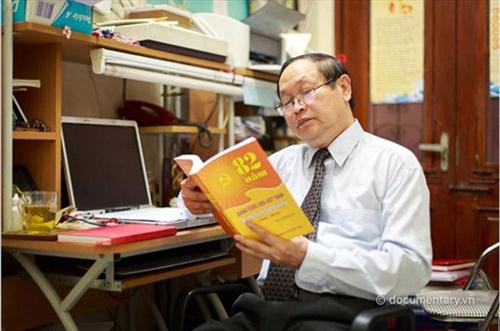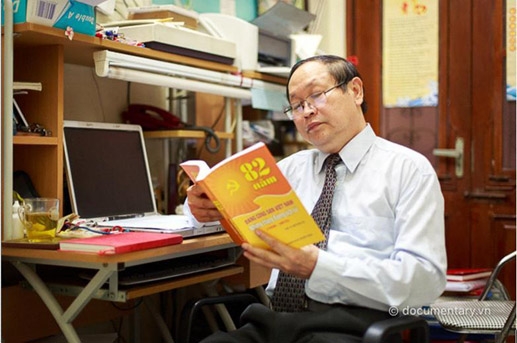
The needs of society require a full understanding of the country's history through official documents such as textbooks. The lack of information is making it difficult for many people, including students, to distinguish right from wrong due to lack of knowledge. As a result, students tend to be less interested in the country's history in general and the subject of history in particular. Dai Doan Ket Newspaper interviewed Associate Professor, Dr. Ngo Dang Tri - Faculty of History, University of Social Sciences and Humanities, VNU on this issue.

Associate Professor, Dr. Ngo Dang Tri.
|
History provides knowledge and experience, what should be kept and promoted, what should be abandoned and avoided, so that today we can act in accordance with historical laws, develop, reach new heights, and integrate with the times. Today's young generation has enough wisdom and courage to absorb the truth of national history from ancient times to the present, both tragic and heroic as they are. |
PV:Many people expressed their dissatisfaction when information about the war to protect the northern border was only 11 lines in the 12th grade history textbook. In your opinion, why have textbooks devoted so little time to this issue in recent times?
Associate Professor, Dr. Ngo Dang Tri: The reason why the 12th grade History textbook only has 11 lines about the war to protect the northern border in 1979 is because the Education Publishing House shortened it according to the common concept at the time of publication.
Indeed, only 11 lines is too few, if not sketchy, to tell the story. Perhaps it was influenced by the concept of the normalization of Vietnam - China relations in political, diplomatic, economic, military and cultural aspects at that time. Like the motto "closing the past, looking towards the future".
Many opinions say that new textbooks must mention events of protecting land and island borders. In your opinion, how should this be done appropriately?
- History is events (incidents) that have happened. Concealing or distorting historical events is killing history. If we want to talk about the history of protecting Vietnam's borders and islands, we cannot help but talk about the Hoang Sa naval battle in 1974, the Southwestern border war and the Northern border war in 1978-1979, the Vi Xuyen battle to protect the Northern border in 1984, the Gac Ma battle to protect Truong Sa in 1988,...
History is the science of studying and presenting those events. We only know about the events that happened through historical documents. Historical documents are the containers of information about events; there are direct documents, at the same time about the events, there are indirect documents, created later. The more accurate, rich, and multi-dimensional the events and documents are, the more accurate the historical perception is.
Because there is a certain gap between historiography, history and truth, understanding the truth of history is very difficult and must be carried out seriously, meticulously, with real scientific research methods. General Vo Nguyen Giap, former Honorary President of the Vietnam Historical Association, reminded historians that: "History happens only once, but writing history must go through many times" for that reason.
Including the 1979 war in textbooks needs to be placed in the long-term historical relationship between Vietnam and China, to see that besides being friendly neighbors, there was also a time when China invaded Vietnam and Vietnam had uprisings and resistance wars against China to gain independence and protect the Fatherland.
During the resistance war against French colonialism and American imperialism, China helped Vietnam a lot, but there were also times of border conflicts, even a war to defend Vietnam's homeland in 1979.
Only then will students see the continuity and essence of what is temporary and phenomenal, and therefore not think that it only has a negative impact on the Vietnam-China relationship, but more importantly and necessary is to enhance patriotism, the will for independence, respect for the help of the Chinese people, the viewpoint of both cooperation and struggle, the spirit of vigilance in protecting the country, etc.
As both a historical researcher and a lecturer, what do you think is the significance of including information about the events of the struggle to protect the borders and islands in textbooks for students?
- For our history subject, its function is to preserve and pass on the nation's past to the present generation. President Ho Chi Minh said: "Our people must know our history/ To understand the origin of our Vietnamese nation." Losing the memory of the past is losing the nation's roots, is losing one's roots.
At a higher level, history also provides knowledge, experience, what should be kept, promoted and what should be abandoned, what should be avoided, so that today we can act in accordance with historical laws, develop, reach new heights, and integrate with the times. Therefore, the historical past, including the history of the struggle to protect the border in 1979, a major event, a concrete and vivid expression of protecting the country's sovereignty and protecting national values, needs to be remembered and passed down, both to understand the merits of previous generations and to build awareness of protecting the country, protecting the current borders, territory, airspace, and sea and islands.
In other words, providing knowledge about the border protection struggles is of great scientific and practical significance, a responsibility of the education sector in particular and of society in general. Including the above historical events in history textbooks about the struggle to protect the island borders is necessary and normal; otherwise, forgetting or exaggerating them is abnormal and a mistake against history. Let history speak.
For a long time we have not considered History and Literature as sciences. Do you think this lack of objectivity is one of the reasons why students are bored with studying history? With many years of teaching experience, how do you see the world dealing with this issue?
- History has both heroic epics and tragic songs. In my opinion, the phenomenon of students not liking to study history is not necessarily due to the teaching method, the teachers and students' poor awareness, weak expertise, but basically due to the content of the subject, a subject that often only talks about one side of history, the side of victory, goodness, glory, rarely talks about mistakes, failures, pain, shame, so it is not true to the inherent truth of the past.
Cutting history according to subjective wishes to serve temporary purposes is a simple, voluntaristic way of thinking that invisibly distorts the truth. It not only makes the younger generation misunderstand history but can also lead to misconceptions about the past, leading to erroneous misconceptions about the present and future.
For a long time, history textbooks have not included or only included the above events in a very brief way, which is incorrect both in terms of scientific awareness and the goal of civic education. This is one of the reasons why students are indifferent, if not bored with studying, and "turn their backs" on the subject of history. Today's young generation has enough intelligence and courage to absorb the truth of national history from ancient times to the present, both tragic and heroic as they are.
With a natural desire to discover the truth and know new things, they are allergic to one-sided information, but pay close attention to accurate historical events, including historical tragedies, meaning they do not despise history as a true science.
In other words, only historical truth can make the young generation return to history.
In response to strong public opinion, the Ministry of Education and Training has just announced that it will consider including border and island wars in the new textbooks. But in the meantime (it is said to take several years), what should the Ministry of Education and Training do to promptly address this issue?
- I support the above opinion of the leaders of the Ministry of Education and Training and the opinions of many veteran cadres and other scientists that we must include in history textbooks the events of the battle to protect the northern and southwestern borders in the period of 1978-1979 and the long-standing struggle to protect the islands in Truong Sa and Hoang Sa, to teach students to understand those historical events. However, changing the program and curriculum is not simple, cannot be rushed, but requires time.
In the meantime, I think the Ministry of Education and Training can draft a professional document to guide teachers in teaching history about the above events. The spirit is to speak correctly and clearly with authentic documents about the events that happened objectively, including images and data from Vietnam and internationally.
The aim is to help students systematically see the basic features of the Vietnam-China relationship and the issue of protecting Vietnam's borders and islands during that period in particular. The content of the events should be concise, chronological in nature, and provide accurate information.
When provided with objective, basic information about the above historical events, students are proactive in knowing the truth as it is, they will draw out the necessary, correct perceptions for themselves, because historical truth has a strong inspirational power and its very effective humanistic and ideological values. And that is also a solution that contributes to making history more attractive, making students more interested in history.
Thank you very much!
Tam Nhu- Dai Doan Ket Newspaper(perform)
Author:Tam Nhu - Dai Doan Ket Newspaper
Newer news
Older news